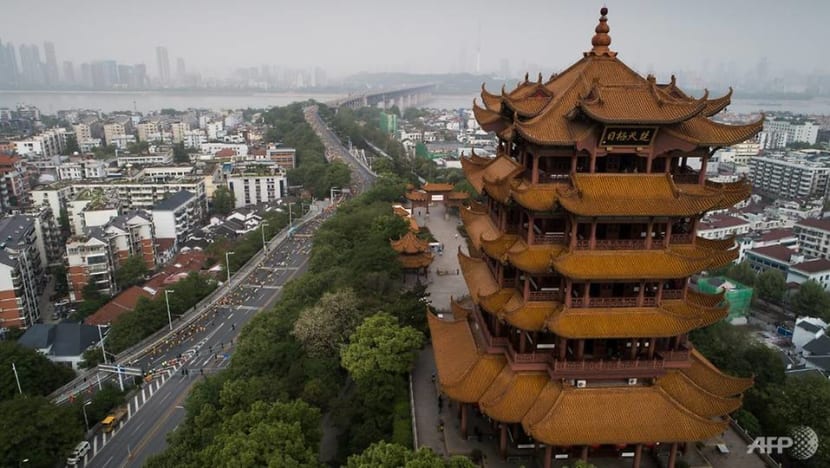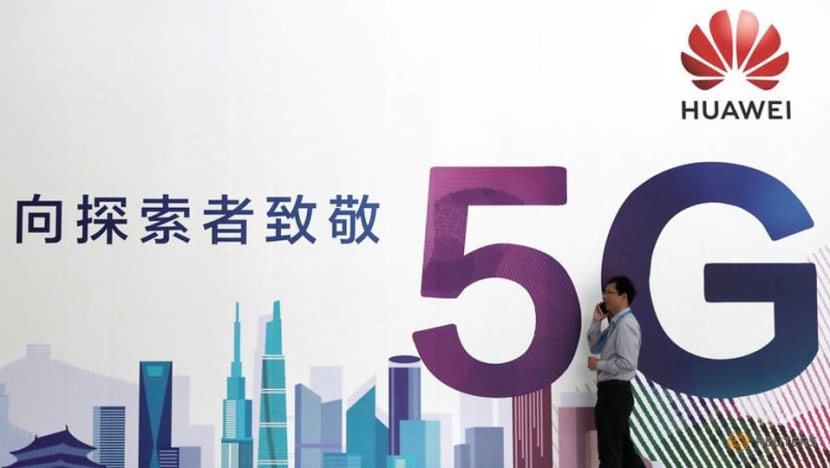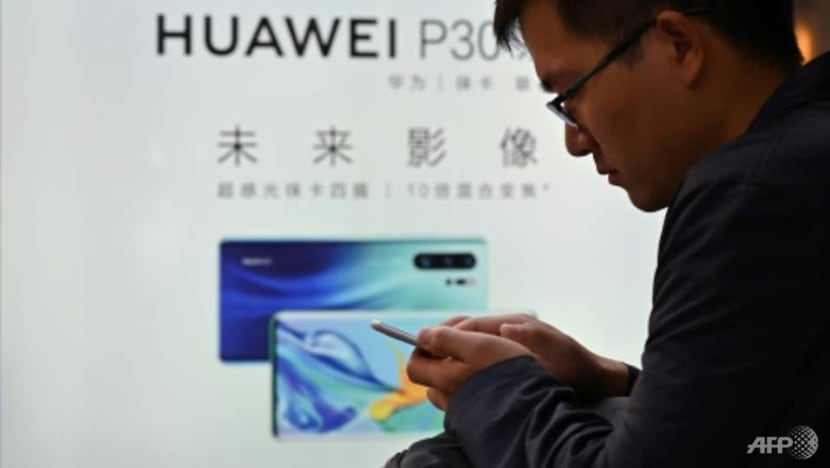commentary Commentary
Commentary: Huge investments and 5G super highways. How China is powering ahead in the network race
5G promises huge benefits for China as the country pushes on with research, development and testing of new technologies, say ARA Private Fund’s Dr Chua Yang Liang and Sean Ng.

FILE PHOTO: A girl broadcasts live from a phone as she holds a selfie stick with a sign of the live-streaming platform DouYu during an event celebrating the new year in Wuhan, Hubei province, China, December 31, 2018. (Photo: REUTERS/Stringer/File photo)
SINGAPORE: The future of 5G holds huge promise, of total connectivity of devices and the ubiquity of technology in our everyday lives.
China made its 5G ambitions clear since 2013 in the Made in China 2025 plan. Since then, China has invested heavily into 5G.
We are now seeing the fruits of China’s efforts, as 5G reaps economic dividends and transforms China’s cities.
READ: The US-China contest is a race towards 5G domination, a commentary

5G IS CREATING MORE CHINESE BUSINESS AND JOBS
China’s 5G investment has helped to supercharge businesses and create new jobs. Much of these investments have poured in from the public sector.
In China’s latest five-year plan (2015 to 2020), the government earmarked US$400 billion for investment into 5G, helping to drive China’s 5G investment above those of key rivals in developed countries.
More than US$900 billion in output and 8 million jobs will be created by 2030, said the China Academy of Information and Communications Technology.
The race for now looks asymmetrical. According to Deloitte, China outspent the US by US$24 billion in 5G infrastructure between 2015 and 2018.
The Chinese private sector has also moved rapidly in the 5G space, giving the country’s national efforts a huge boost. Huawei recently set up a research centre for innovation in 5G and related fields in Hefei, Anhui.
Even foreign partners want a piece of the Chinese pie. Nokia has partnered Tencent to build and test 5G applications. The partnership leverages Tencent’s over 1 billion users on instant messaging software giants WeChat and QQ.

Private sector investment into 5G is expected to surge following issuance of the first 5G commercial licenses by China’s Ministry of Industry and Information Technology (MIIT) in June.
China’s three largest state-owned telecom operators – China Mobile, China Unicom, and China Telecom – were the first recipients, although more carriers are expected to receive licenses soon.
China Mobile has already announced plans to invest over US$10 billion in 5G, of which US$5.6 billion will be channelled towards 5G-related procurement, whilst another US$4.4 billion will go towards a 5G industry fund.
With other carriers look set to follow suit, investment into 5G is likely to continue ramping up, providing a much needed push for the Chinese economy, which has recently seem a three-decade low this year.
REVOLUTIONARY CHANGES
Robust investment into China’s 5G ecosystem has already developed 5G uses that are transforming China’s cities. Wuhan, capital of China’s Hubei province and a 5G pilot city, sheds light on China’s 5G future.
Wuhan is home to China’s first 5G-based smart production line. The facility, opened by China Information Communication Technology (CICT), reportedly improves productivity by 30 per cent using automation and 5G networks, using robotic arms to assemble equipment and transmitting its operating status in real-time.
Also significant is Wuhan’s push towards being a smart city. It has already implemented China’s first 5G smart street-lamps which are more energy efficient as the illuminance is adjusted based on road usage, weather and natural light conditions.

China Mobile has also started work on the world’s first 5G smart highway project. This smart highway is touted to be capable of supporting cellular network-coordinated transportation such as smart toll stations that effectively remove the need for any human operators. Real time traffic information with AI prediction will be added to support autonomous vehicles eventually.
Other Chinese cities are also showcasing interesting uses of 5G.
Baidu has used 5G test networks in Xiong’an, a new city southwest of Beijing, to livestream events in virtual reality.
In Fangshan, 5G capability has enabled autonomous vehicles to transmit data to each other to avoid collisions. Similarly, Chinese bus manufacturer Yutong is testing the world’s first 5G autonomous electric buses in Zhengzhou.
While these cases suggest that the 5G’s transformation of China is still in its early stages, they hold great potential for the kind of impact 5G applications can make.
Research by IHS Markit forecasts that China’s 5G value chain alone could contribute US$984 billion in economic output and support 9.5 million jobs by 2035.
SPILLOVERS IN OTHER INDUSTRIES
Huge positive spill-over effects to other sectors can arise once 5G development in China take off.
Real-estate investors are likely to see significant opportunities arising from 5G in China. As 5G revolutionises work processes, it can create new business opportunities for property and property technology.

READ: Cutting through the 5G smoke and mirrors, a commentary
Leasing demand for multiple real-estate asset classes should rise as a result of these new demand drivers. We have also seen an increase in the adoption of technology in China’s real estate industry, including a surge in the development of new property technology.
A report by investment firm JLL revealed that Asia Pacific region received over half of the US$7.8 billion invested in Property technology (PropTech) firms globally between 2013 and June 2017.
Not surprisingly, China was the key beneficiary. The country has adopted technology in many real-estate verticals, from brokerage and leasing to project development, investment and financing.
5G could further the development of these technologies.
For example, the collection of real-time data on user experience through the Internet of Things in an office or the pattern of human traffic flow in a mall could inspire a next wave of proptech development that identify dead spaces in mall design and promote greater productivity in office layouts.
In the competition for greater foreign direct investment, cities are racing to adopt 5G technologies to achieve smart city status and create a better urban environment for people.
A survey from The Economist Group and Intel showed that most respondents ranked “improvement in the quality of life” as a benefit of the adoption of smart city technology.
Quality of life is a major factor that attracts top talent and firms to any city, and this can only get increasingly more important in the future.
READ: Explainer - Securing the 5G future - what's the issue?

GATHERING CLOUDS OVER THE PROSPECT OF 5G IN CHINA
Although China stands to gain significantly from 5G, the recent spate of global events could endanger its 5G prospects.
READ: This brewing tech rivalry may create Chinese isolationism, a commentary
Many market watchers have flagged the possible delay in the development of China’s 5G network amid brewing concerns about cybersecurity, surveillance and spying, notwithstanding that the US has pulled back from the Huawei trade ban.
A delay in China’s plans for 5G development could also lead to a bifurcation of the 5G infrastructure. One part of the world could adopt the new Chinese standard, and the other use only European or American-made telecommunication technologies.
READ: Huawei may create a world split along tech lines, a commentary
But 5G presents the best chance for China to leapfrog advanced economies to lead technology development on a global scale. And in this race, China looks set to maintain its pole position for some time.
Dr Chua Yang Liang is Head of Research and Strategy at ARA Private Fund. Sean Ng is Analyst, Research and Strategy at the same company.
















